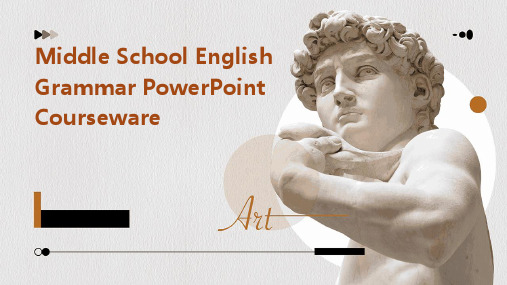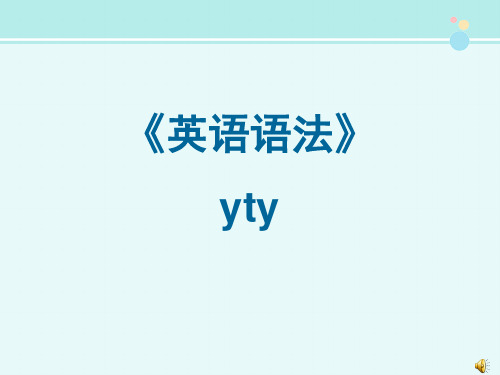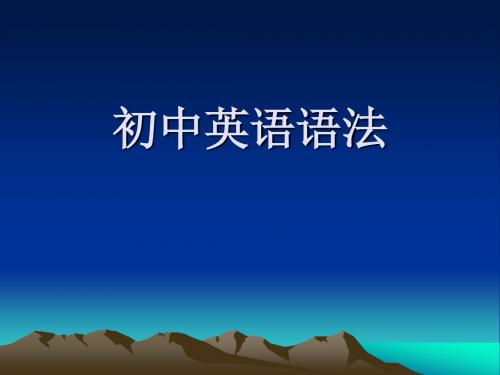最新初中英语语法PPT课件教学讲义PPT课件
合集下载
初一英语英语语法总结(共51张PPT)

一、名词
个体名词
普通名词
具体名词
集体名词
名
专有名词
词 抽象名词
单数
名 可数名词 复数 词
不可数名词
英语语法中,名词有两种数的形式: 1)单数(表示一个人或事物); 2)复数(表示多于一个的人或数)。 只有可数名词才有复数形式。
名词的数:
名词复数形式的构成
形式
变化规则
发音
例词
一般情况
+s
1. 清辅音结尾的名词后[s] 2. 浊辅音结尾的名词后[z]; 3. 元音结尾的名词后[z];
2. 在某些度量表示法中: We have PE lessons three times a week.
3. 用在单数的表语名词前,以表示职业、行业、宗教、等级等。 George wants to be an engineer.
4. 在以what引导的感叹句中,单数的可数名词前。 What a pretty girl!
Be动词
am, is, are was, were
been
is 1. He ________ very good at English.
Practise
are 2. My father and I ________ going to Beijing next month. Were 3. ________ you on duty the day before yesterday?
3. 用在后面跟有限定性介词短语的名词前。 the letter from America, the fourteenth of April
4. 用在泛指的乐器名词前。 He plays the piano.
5. 一些常用短语。 by the way, in the morning, What’s the matter?
初中英语语法课件ppt

vacation together.
过去将来时的使用:
一、过去将来时表示对于过去某一时间而言将要发生的动 作或存在的状态。 would或was /were going to + V
would可用于各种人称。
二、would +V还可表示过去的习惯动作,在这点上同used to同义。
When we were children, we would/used to go swimming every summer.
e) 用于条件从句“如果……想,设想”(接近if ……want to,或 if ……should) 例:Greater efforts to increase agricultural production must be made if food shortage ____________ avoided. A) is to be B) can be C) will be D) has been
一般现在时的动词形式: 动词原形 1.am;is ;are 2.have,has 3.第三人称单数形式-(e)s
肯定句:I watch television every day.
否定句:I don’t watch television every day.
疑问句:Do you watch television every day.
一般现在时的使用:
1.一般现在时表示总是、通常、习惯 性的动作或状态。
It snows in winter. I watch television every day.
2.用于对客观事实的普遍性的陈述。
Water consists of hydrogen and oxygen. Most animals kill only for food. The world is round.
过去将来时的使用:
一、过去将来时表示对于过去某一时间而言将要发生的动 作或存在的状态。 would或was /were going to + V
would可用于各种人称。
二、would +V还可表示过去的习惯动作,在这点上同used to同义。
When we were children, we would/used to go swimming every summer.
e) 用于条件从句“如果……想,设想”(接近if ……want to,或 if ……should) 例:Greater efforts to increase agricultural production must be made if food shortage ____________ avoided. A) is to be B) can be C) will be D) has been
一般现在时的动词形式: 动词原形 1.am;is ;are 2.have,has 3.第三人称单数形式-(e)s
肯定句:I watch television every day.
否定句:I don’t watch television every day.
疑问句:Do you watch television every day.
一般现在时的使用:
1.一般现在时表示总是、通常、习惯 性的动作或状态。
It snows in winter. I watch television every day.
2.用于对客观事实的普遍性的陈述。
Water consists of hydrogen and oxygen. Most animals kill only for food. The world is round.
初中英语语法ppt课件

04
Positions and connections
The usage of commonly used positions
At
used to indicate a specific point in time or place
In
used to indicate a period of time or a location within a larger space
Nouns that cannot be counted or have a plural form. Example: "I have some sugar in the cupboard."
The positive case of nouns
Passive nouns
Nouns that show session or ownership They are formed by adding's to the end of the noun Example: "The teacher's book"
Example
"The cat is bigger than the dog." - "bigger" is the comparative degree of the objective "big."
Formations
The comparative degree of advisors and advisors typically end with "- er" or "- ier", or can be formed by using the suffix "- er" or "- more"
初中英语语法大全精品PPT课件

多时,谓语用复数。 如:There is a sheep in the yard.(院子里有只绵羊)
There are some sheep in the yard.(院子里有一些绵羊) 4、maths, news等虽然有s结尾,但不是复数,因此谓语仍用单数: 如:The news is very exciting. (这个消息令人兴奋)
[注解]:
① ‘s还可以表示某人的家或者某个店铺, 如:my aunt’s(我阿姨家), the doctor’s(诊所)
② 两人共有某物时,可以采用 A and B’s 的形 如:Lucy and Lily’s bedroom(露西和丽丽合住的卧室)
Lucy’s and Lily’s bedroom(露西和丽丽分别的卧室)
如果表示整体概念,则谓语用单数形式, 如:Class Three is a very good class.(三班是好班) 如果表示其中的所有成员时,则谓语用复数形式, 如:Class Three have a map of China.(三班有张中国地图) 3、Chinese, Japanese, fish, sheep, people等表示单个时谓语用单数,表示许
如: box, child, orange;
不可数名词{u} 是不可以用简单的数词进行计数的名词。
如:water, news, oil, population, information .
英语可数名词的单复数
1、名词由单数变复数的基本方法如下: ①在单数名词词尾加s。 如:map → maps,boy→ boys,horse→ horses, table→ tables. ②s,o,x ,sh,ch结尾的词加es. 如:class→classes, box→boxes, hero→heroes, dish→dishes,
There are some sheep in the yard.(院子里有一些绵羊) 4、maths, news等虽然有s结尾,但不是复数,因此谓语仍用单数: 如:The news is very exciting. (这个消息令人兴奋)
[注解]:
① ‘s还可以表示某人的家或者某个店铺, 如:my aunt’s(我阿姨家), the doctor’s(诊所)
② 两人共有某物时,可以采用 A and B’s 的形 如:Lucy and Lily’s bedroom(露西和丽丽合住的卧室)
Lucy’s and Lily’s bedroom(露西和丽丽分别的卧室)
如果表示整体概念,则谓语用单数形式, 如:Class Three is a very good class.(三班是好班) 如果表示其中的所有成员时,则谓语用复数形式, 如:Class Three have a map of China.(三班有张中国地图) 3、Chinese, Japanese, fish, sheep, people等表示单个时谓语用单数,表示许
如: box, child, orange;
不可数名词{u} 是不可以用简单的数词进行计数的名词。
如:water, news, oil, population, information .
英语可数名词的单复数
1、名词由单数变复数的基本方法如下: ①在单数名词词尾加s。 如:map → maps,boy→ boys,horse→ horses, table→ tables. ②s,o,x ,sh,ch结尾的词加es. 如:class→classes, box→boxes, hero→heroes, dish→dishes,
初中英语语法专题课件完整版(共983张PPT)

2.不规则变化
构成方法
例词
形式不变 (单复数同形)
sheep-sheep deer-deer Chinese-Chinese Japanese-Japanese
变内部元音字母
foot-feet tooth-teeth goose-geese man-men mouse-mice
词尾加-en/-ren
a group of 一队,一组,一群
②还可用much,little,a little of,a large amount/deal of, no,plenty of等来修饰不可数名词,some,any既可修饰可数名词也可修 饰不可数名词。
much money,plenty of water a little of air some(肯定句): some milk ,some apples any(疑/否):Are there any stamps?I don’t have any money (5)数词-名词-形容词构成的复合形容词,中间的名词不能用
普通名词又可分为下面四类:
1)个体名词:表示单个人或单个事物。 如:gun、kid 、book。 2)集体名词:表示一群人或一些事物组成的集合体。 如:family。
3)物质名词:表示无法分为个体的物质、材料、食品、饮料、液体、气体、 金属等名称的名词,
如:pork、wood、bread、water、air。 4)抽象名词:表示动作、状态、品质、感情等抽象概念及学科、疾病。 如:work 。Hunger、honesty 、love、Chinese、success、HIV。 个体名词和集体名词可以用数目来计算,称为可数名词。
f,fe 为v,再加 -es
shelf-shelves thief-thieves
《初中英语语法》PPT课件

We know (that)we should learn from each other. Please tell me if/whether you have been to America. Could you please tell me where the restrooms are? 引导词是从句的一个成份,所以用哪个引导 词,看从句成份是 否完整,不完整,一定是特殊疑问句。完整,判断主句语气, 是疑问语气,用if/whether; 是肯定语气,用that.
2:用that, if/whether, how,where,what,….等连接词填 空.
that they will visit our school next week. 1.I hear_____
who the girl is? 2.Do you know_____ how can get to the park? 3.Could you tell me _____I 4.We thought ______you had never been there before . that 5.Please tell me_______ you live. where 6.Mother asked me ___________ I had finished my if/whether homework.
why 7.Do you know_____ she is angry? what 8.The teacher asked_____ your name was. how old
9.Tom is ten.I want to know _________ you whether are.
10.He asked you_______ you were a student or not.
初中英语语法ppt课件

Practical learning: The Curriculum provides a variety of practical exercises and tasks, such as fill in exercises, presence completion exercises, composition writing tasks, etc., so that students can apply the knowledge learned to real life situations and improve their practical ability
Active learning: The Curriculum provides a variety of visual effects, human animations, interactive exercises, etc., to help students actively participate in the process of leaexplore the knowledge points according to the teaching content, complete the practice exercises interactively, and master the knowledge of English grammar through their own efforts
Intense Pronouns
03
CHAPTER
Verbs and verb tensions
Regular verbs
Follow a regular pattern in forming their variant forms For example, in English, most verbs form their past tense by adding "- ed" to the base form (e.g., "walk walked")
初中英语基础语法完整ppt课件

初中英语基础语法
最新课件
1
名词、形容词、代词、 数词、冠词、动词、 副词、介词、连词、感叹词
最新课件
2
名词(n.): 表示人、事物、地点或抽象概念 的名称。
如:boy, morning, bag, ball, class, orange.
最新课件
3
英语名词可分为专有名词和普通名词两大类。
1)专有名词:是国名、地名、人名、团体、机构等的专用 名称。
chief-chiefs, proof-proofs, roof-roofs
hero-heroes, potato-potatoes, tomato-tomatoes, piano-pianos, radio-radios, zoo-zoos
最新课件
18
综合挑战,你敢接吗?
plane s
brushes churches pianos
示范:cat ---- cats 答题者说出名词复数后要拼写正 确,否则不计分
最新课件
21
需要记分员和主持人一名
要求:
1.记分员和主持人要本着公平公正的原则,不得有 人和私心,其他组成员发现有不公平现象,经大家 同意,给记分员和主持人所在组减分。
2.记分员和主持人若想参与游戏,可与本组人员交 换
最新课件
potato-potatoes tomato-tomatoes
radio-radios,
zoo-zoos
* piano-pianos photo-photos
最新课件
17
一般情况在词尾加-s
以s, x, ch, sh结尾的名词 后加-es 以辅音字母加y结尾的名 词,变y为i加-es
以-f或-fe结尾的名词一般 变-f或-fe为v再加-es
最新课件
1
名词、形容词、代词、 数词、冠词、动词、 副词、介词、连词、感叹词
最新课件
2
名词(n.): 表示人、事物、地点或抽象概念 的名称。
如:boy, morning, bag, ball, class, orange.
最新课件
3
英语名词可分为专有名词和普通名词两大类。
1)专有名词:是国名、地名、人名、团体、机构等的专用 名称。
chief-chiefs, proof-proofs, roof-roofs
hero-heroes, potato-potatoes, tomato-tomatoes, piano-pianos, radio-radios, zoo-zoos
最新课件
18
综合挑战,你敢接吗?
plane s
brushes churches pianos
示范:cat ---- cats 答题者说出名词复数后要拼写正 确,否则不计分
最新课件
21
需要记分员和主持人一名
要求:
1.记分员和主持人要本着公平公正的原则,不得有 人和私心,其他组成员发现有不公平现象,经大家 同意,给记分员和主持人所在组减分。
2.记分员和主持人若想参与游戏,可与本组人员交 换
最新课件
potato-potatoes tomato-tomatoes
radio-radios,
zoo-zoos
* piano-pianos photo-photos
最新课件
17
一般情况在词尾加-s
以s, x, ch, sh结尾的名词 后加-es 以辅音字母加y结尾的名 词,变y为i加-es
以-f或-fe结尾的名词一般 变-f或-fe为v再加-es
英语语法-完整版PPT课件

am 8 Who ________ not at school last Monday
9 Have you ever ________ to Japan
动词的基本形式
原形
第三人称单 数现在式
过去式
过去分词 现在分词
study studies studied studied studying
do
does
不定冠词a,an
只能用于单数可数名词之前
冠
词
单数可数名词
定冠词the
复数可数名词
不可数名词
零冠词
名词前可不用冠词
不定冠词的用法:
表示“一”,“任何一个”或“不管哪一个” 的意思。
I have a sister and two brothers 2 在某些度量表示法中:
We have es a wee 3 用在单数的表语名词前,以表示职业、行业、
reads read
sweeps swept plays played
carries carried
Practise
现在分词
having giving getting reading sweeping playing carrying
五、动词的时态
动词时态是表示动作或状态发生或存在的时间和表示方式的一种动词形式。
_____ colletghe e
the
11/______ Monday betfohree _____ Spring Festival was very cold
12THhavee you had ______dinner
/
/
/
/
a
/
a
The
/ /
初中英语语法PPT课件 (1)

• • • •
(5)反身代词本身不能单独作主语。 *Myself drove the car. I myself drove the car.我自己开车。 (6)但在and,or,nor连接的并列主语中,第二 个主语可用反身代词,特别是myself作主语。 • Charles and myself saw it. • (7)第二人称作宾语,要用反身代词。 • You should be proud of yourself.你应为自己感到 骄傲。
第六章 数词
• 基数词的构成是: • 个十用“-”连,百位之后and, 千位点“,”分 段读;一逗千,二(逗)百万,三逗号就 是百万万。 • 基数词变序数词歌 • 基变序,有规律,词尾加上-th;一、二、 三,是特例,结尾字母t,d,d;八去t,九 去e,ve要用f替;ty改成tie,再加-th变几十; 几十几也简单,前用基来后用序。
must/have to
• (1)must表示出于主观意识而必须要做某事, have to却表示由于某种客观原因而不得不做某事。 除此以外,have to自身有时态的变化形式。 • Must的三种否定形式绝不能、一定不要mustn’t, be not to不必needn’t推测can’t——Must we hand in our exercises today?我们今天必须交作业吗? • (2)must常用于肯定句中表示猜测:对现在或 未来的事进行猜测时,后接动词原形;对已经发 生的事进行猜测时,后接have+过去分词。
第十一章 虚拟语气
• 在表示建议、命令、要求、忠告等动词的后面的 宾语从句中的虚拟语气。 • 可总结为: • 一个坚持两命令,三个要求四建议。 • 一个“坚持”:insist。 • 两个“命令”:command,order。 • 三个“要求”的:request,demand,require。 • 四个“建议”:propose,suggest,advise, recommand。
- 1、下载文档前请自行甄别文档内容的完整性,平台不提供额外的编辑、内容补充、找答案等附加服务。
- 2、"仅部分预览"的文档,不可在线预览部分如存在完整性等问题,可反馈申请退款(可完整预览的文档不适用该条件!)。
- 3、如文档侵犯您的权益,请联系客服反馈,我们会尽快为您处理(人工客服工作时间:9:00-18:30)。
• 例句: • Are you going to read ? • He is coming tomorrow .
• 练习题:
• 1. There __________ a meeting tomorrow after noon. A. will be going to B. will going to be C. is going to be D. will go to be
• A. will be; is B. is; is C. will be; will be D. is; will be
现在完成时
• 构成: • have / has +PP • have/has been+doing
• 用法: • 发生在过去影响在现在的动作或状态等
• 象征词: • 含糊的频率副词 already just never ever
• 例句: • He wrote a letter yesterday. • I studied hard last year.
• 练习题: • 1. What _____they _____dinner yesterday ? • A. do; have for B. did; had for C. did; have for
• 用法: • 表示经常性的 • 动作或状态
• 象征词: • Every often always on 天 in月、季、节、年。
一般过去时
• 规则变化: • 一般/去e 双写/辅+y结尾-ied • 不规则变化: • go-went come-came • do-did leave-left等
• “When ________ you __________ (have) it?” “I ____________ (have) it at 12:00.”
• 2. “_______ you _______ (write) a letter to your aunt yet?”
• “Yes, I ___________. I ________________ (w rite) one last week.” 、 3. “_________ he ____ (finish) his homework?” “Not yet.” 、 4. “_________ they ever __________ (be) abroa d?” “Yes, just once.” 、 5. Your father _________ just ___________ (fini sh) his work.
D. were; have for • 2. Could you tell me what time the plane ______
? • A. left B. leaves C. leaved D. was leaving • 3. One of us ______band last month. • A. leaves B. leave C. leaved D. leftre next month.
• A. isn't working B. doesn't working C. isn't g oing to working D. won't work
• 3. He ________ very busy this week, he _____ ___ free next week.
一般将来时
• 构成: • be going to+V原 • will / shall + V原
• 用法: • 在将来某个时间或 • 某段时要做的事
• 象征词: • tomorrow / after • next / tonight in 2010
一般将来时
不规则变化: • Go come leave stay • fly等用进行表将来
• 2. Charlie ________ here next month.
• A. isn't working B. doesn't working C. isn't g oing to working D. won't work
• 3. He ________ very busy this week, he _____ ___ free next week.
现在进行时
规则变化: • 一般去e 双写+ing • 不规则变化: • tie die lie – • 变ie为y加ing
• 例句: • Tom is writing now . • They are lying on the bed .
• 练习题:
• 1. There __________ a meeting tomorrow after noon. A. will be going to B. will going to be C. is going to be D. will go to be
初中英语语法PPT课件
初中语法分类
• 初中语法项目分类:(共8类) • 一般分类 • 1、一般现在时 • 2、一般过去时 • 3、一般将来时 • 4、现在进行时 • 5、现在完成(进行)时 • 6、过去进行时 • 7、过去完成时 • 8、过去将来时
一般现在时
• 构成: • 动词用原形 • 三人称单数-s / es
• A. will be; is B. is; is C. will be; will be D. is; will be
现在进行时
• 构成: • be+doing
• 用法: • 表此时此刻正进行的动作或状态
• 象征词: • listen look now • all the time Don’t…
现在完成时
规则变化: • 分词规则的同过去式是一样的 • 不规则变化: • 不规则的动词的过去分词需逐个记忆
• 例句: • I have been teaching for 8 years. • He has slept for two days.
• 练习题:
• 1. “_________ you __________ (have) lunch ?” “Yes.”
• 练习题:
• 1. There __________ a meeting tomorrow after noon. A. will be going to B. will going to be C. is going to be D. will go to be
• A. will be; is B. is; is C. will be; will be D. is; will be
现在完成时
• 构成: • have / has +PP • have/has been+doing
• 用法: • 发生在过去影响在现在的动作或状态等
• 象征词: • 含糊的频率副词 already just never ever
• 例句: • He wrote a letter yesterday. • I studied hard last year.
• 练习题: • 1. What _____they _____dinner yesterday ? • A. do; have for B. did; had for C. did; have for
• 用法: • 表示经常性的 • 动作或状态
• 象征词: • Every often always on 天 in月、季、节、年。
一般过去时
• 规则变化: • 一般/去e 双写/辅+y结尾-ied • 不规则变化: • go-went come-came • do-did leave-left等
• “When ________ you __________ (have) it?” “I ____________ (have) it at 12:00.”
• 2. “_______ you _______ (write) a letter to your aunt yet?”
• “Yes, I ___________. I ________________ (w rite) one last week.” 、 3. “_________ he ____ (finish) his homework?” “Not yet.” 、 4. “_________ they ever __________ (be) abroa d?” “Yes, just once.” 、 5. Your father _________ just ___________ (fini sh) his work.
D. were; have for • 2. Could you tell me what time the plane ______
? • A. left B. leaves C. leaved D. was leaving • 3. One of us ______band last month. • A. leaves B. leave C. leaved D. leftre next month.
• A. isn't working B. doesn't working C. isn't g oing to working D. won't work
• 3. He ________ very busy this week, he _____ ___ free next week.
一般将来时
• 构成: • be going to+V原 • will / shall + V原
• 用法: • 在将来某个时间或 • 某段时要做的事
• 象征词: • tomorrow / after • next / tonight in 2010
一般将来时
不规则变化: • Go come leave stay • fly等用进行表将来
• 2. Charlie ________ here next month.
• A. isn't working B. doesn't working C. isn't g oing to working D. won't work
• 3. He ________ very busy this week, he _____ ___ free next week.
现在进行时
规则变化: • 一般去e 双写+ing • 不规则变化: • tie die lie – • 变ie为y加ing
• 例句: • Tom is writing now . • They are lying on the bed .
• 练习题:
• 1. There __________ a meeting tomorrow after noon. A. will be going to B. will going to be C. is going to be D. will go to be
初中英语语法PPT课件
初中语法分类
• 初中语法项目分类:(共8类) • 一般分类 • 1、一般现在时 • 2、一般过去时 • 3、一般将来时 • 4、现在进行时 • 5、现在完成(进行)时 • 6、过去进行时 • 7、过去完成时 • 8、过去将来时
一般现在时
• 构成: • 动词用原形 • 三人称单数-s / es
• A. will be; is B. is; is C. will be; will be D. is; will be
现在进行时
• 构成: • be+doing
• 用法: • 表此时此刻正进行的动作或状态
• 象征词: • listen look now • all the time Don’t…
现在完成时
规则变化: • 分词规则的同过去式是一样的 • 不规则变化: • 不规则的动词的过去分词需逐个记忆
• 例句: • I have been teaching for 8 years. • He has slept for two days.
• 练习题:
• 1. “_________ you __________ (have) lunch ?” “Yes.”
